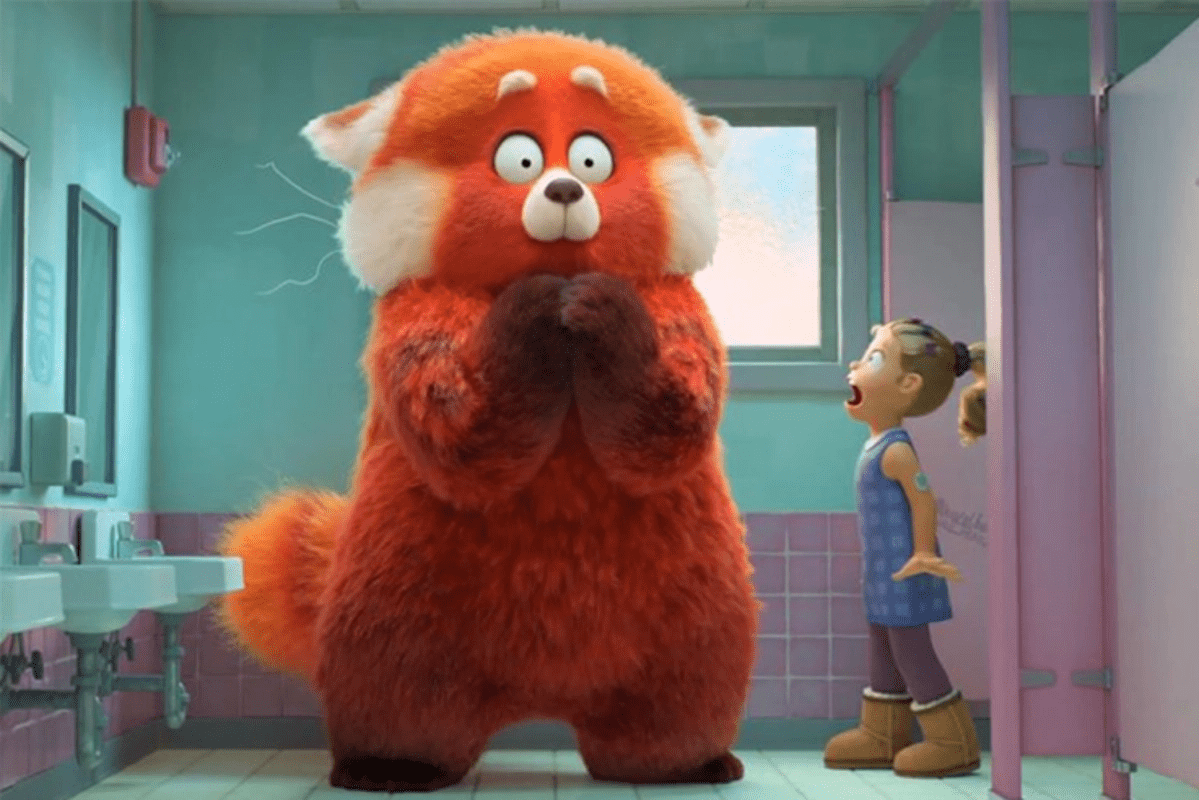Table of Contents
Last Updated on February 2, 2023
All Students Deserve Free Period Products
Create period positive washrooms at your school today!
When menstruation begins, it means major changes to the body.
It comes along with unexpected hair growth, body odours, and seeing the colour red in… new places.
And that’s what Disney Pixar’s Turning Red is all about! The latest Pixar movie has many people asking “is turning red a period metaphor?” and the answer is YES!
The movie’s protagonist, Mei, turns into a red panda unexpectedly overnight as she struggles to balance familial obligations, her love for her friends, and learns to understand her uncomfortable new feelings of attraction.


Mei’s panda is hairy, smelly, red and increasingly independent – and Citron Hygiene, a leading hygiene services company, is celebrating this overdue exploration of menstruation and puberty in pop culture!
Why are people so uncomfortable with the references to periods in Turning Red?
For the most part in our society, menstruation, sex and puberty are topics that aren’t openly discussed (and are often met with shushing when brought up).
Periods are still a taboo subject – we just don’t talk about it.
Why?
People are uncomfortable with the subject of blood in general. 3-4% of the American population are hemophobic (afraid of blood).


And blood related to puberty and sexual health is perceived to be the worst kind of blood because it is socially classified as both gory and sexual.
As a historically taboo topic, those who menstruate have learned not to ask critically important questions about menstrual health and hygiene and to not talk about it. Not talking about something creates an air of secrecy, and secrets lead to shame. Periods are still treated as a “dirty little secret” we need to protect people from knowing about – despite the fact that 1.8 billion people around the world menstruate every single month for most of their lives
Take for example, the feedback shared by a mom who recently watched Turning Red:
“We watched all the way to the part where the mom brings in Ibuprofen & pads. I am absolutely mortified. Luckily (my child) was clueless.” – USA Today
But what could be more natural than a biological function?
And yet, nearly half of all American menstruators have been made to feel ashamed of their periods – and 12% of these were shamed by members of their own family.
Food for thought: Have you ever been embarrassed or ashamed to get a nosebleed? Was anyone else embarrassed for you? Menstruation is normal – nosebleeds are not. Why do people react so differently?
Why do we “turn red” when talking about our periods?
The shame and embarrassment of talking about our periods come from a conservative era that repressed sexuality and uncomfortable subjects like menstruation.


This mentality has trickled down from mother to daughter, father to son, through the generations so that even today many people feel uncomfortable watching a movie like Turning Red because it mentions pads and references puberty.
Are you a parent? What did you think about the movie Turning Red? Follow us on social media and share your thoughts in the comments!
What is period shaming?
Period shaming is the experience of being made to feel uncomfortable about discussing your period, being made to feel embarrassed, or ashamed of experiencing your period. It is the process of silencing discussions of periods and reiterating its taboo nature.
On average, a menstruating person who does not use medical intervention to alter monthly cycles, will menstruate for a total of seven years of their lives. That’s a lot of blood – and a lifetime of feeling like a natural bodily function is something that must be kept secret.
Break the taboo – start talking about periods and help create more period positive spaces. Educating girls – and boys – about menstruation will increase understanding, reduce illnesses caused by poor menstrual hygiene, and help our children grow into healthy, biologically informed adults.
Women around the world experience period shaming on a daily basis. Check out this BuzzFeed article to read more about what that looks like.
What menstrual hygiene experts have to say about “Turning Red”
Probably one of the best lines in the movie Turning Red comes from Mei’s father:
“People have all kinds of sides to them… And some sides are messy. The point isn’t to push the bad stuff away. It’s to make room for it, live with it.”
Especially when it’s literally impossible to avoid living with it. You, your romantic partner, someone you work with, live with, are friends with, or are related to, is going to experience menstruation over the course of their lives…
… and at some point, they’re going to be bleeding in the public washroom of your local coffee shop, restaurant, school, or business!
Menstrual hygiene and period poverty in public washrooms
There are 16.9 billion people in America alone who menstruate that live in poverty. Are the public washrooms in your community equipped to help them access the supplies they need – no matter how much change they have in their pockets when they visit your facility?
Period poverty is the lack of access to menstruation products, education, hygiene facilities and/or hygienic waste management solutions – and period poverty impacts 500 million people worldwide.
It’s up to businesses to normalise periods, and reduce period poverty by ensuring public washrooms are equipped to provide guests with menstrual supplies and menstrual waste disposal methods that will keep customers happy, healthy and washrooms hygienic.
Help Citron Hygiene and Aunt Flow, two global companies partnering together to create period positive spaces, put an end to #PeriodPoverty and equip the washrooms in your community with menstrual product dispensers.
Follow us on social media to join the conversation! How old were you when you got your first period? Where were you, who did you tell first, and how did they react? Normalising our periods starts here!
Related posts:
- Hand dryers: Yes, how you dry your hands matters – here’s why
- A New Period in History: It’s Time to Upgrade Your Menstrual Hygiene Services
- Menstrual Vending Machines: Why Free Period Products Matter
- Period Shaming: Awareness and Prevention
- Period Dignity: The Death of the Dirty Metal Blood Box in Public Bathrooms
- Keep Students in School With Period Positive Restrooms
- Why Creating a Period Positive Washroom Will Bring You More Business
- How to combat period poverty this holiday season
